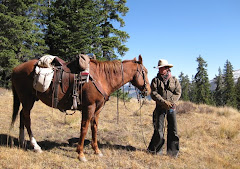
 We find ourselves now in the deepest hour of winter, the farthest point from riding seasons, the one passed, the one anticipated.
We find ourselves now in the deepest hour of winter, the farthest point from riding seasons, the one passed, the one anticipated.Though thoughts of horses never cease. Likewise the care is a steady constant, despite the weather, the season, the schedule, the moods.
In this season, we are reminded that there is so much more to horses than riding. We see only an incomplete picture if we merely look at our horses and our horsemanship in terms of time riding. What we do on the ground matters – and I’m referring to much more than “groundwork” here. Or could we extend the term “groundwork” to include all interactions between horse and human? Perhaps in doing so, we learn to look at each simple interaction with new interest and value – each as an opportunity to discover and grow, for both horse and human.
Often it is through our littlest interactions that we both learn and teach the most. Think about it… what happens between us and our horse(s) during times of feeding, grooming, trimming, leading, handling, care of body and mind – both of which may need extra tending to during the slow and seemingly meaningless cold days of standing around waiting which winter often is. For us, in every interaction, there presents opportunities of gaining knowledge and growing through short and simple lessons of understanding horse behavior, subtle communication, body language, herd psychology, manners, boundaries, respect of human, love of human. Yes, I always seek this latter part as well. Love not because I have treats in my pocket (which I do not, nor do I consider the want of treats to be love) but because I am their fair but firm leader, caregiver, direction giver, provider. A gentle rub on their neck rewards them greater than a pocket full of goodies. At least, this is what I strive for…
Still, this is perhaps less a time of hands on learning as it is one of simple observation. The end result, if we are conscious and consistent, is of equal growth. Our minds must grow as our bodies do; skills of our mind must increase as do skills of our muscles. The two must balance each other. Once again, we strive for balance. How often that word is a part of our horsemanship language.
Last week, I received a note from my 10-year old niece, Alex, describing an opportunity she and her group of Girl Scouts recently had with horses. I had the honor of observing this young lady handle some of my horses almost a year ago, especially in helping me care for my broodmare, Tres, and her newborn, Artemis. I watched as Alex could with a most natural confidence and ease lead the mare through the snow with baby following close behind. I watched as my mare, who I have spent innumerable hours observing and understanding, followed Alex with lightness, interest and a respectful distance. Tres was soft, easy, observant and patient. An interesting combination of regard, sensativity and care.
Alex writes of her observation during her experience last week how the horses seemed comfortable with her: “I don't exactly know why. Maybe cuz I'm not afraid of them?? The world may never know.”
Many of us think we might know, and I suppose Alex does to a degree as well. First of all, because she’s right: she is not afraid. Second, because she also is not overwhelmingly bossy and aggressive. Only a fine balance of caring and confident. Something that at even at her young age comes quiet naturally to her, something that many are still struggling with. It is beautiful to see. The horses see it. They are not easily fooled.
I responded, “You know, I think with horses, they have a good ability to sense people. You can’t fake it with a horse. They see only what is real before them. And what they are most comfortable with in humans seems to be an interesting balance of confidence, understanding, and leadership (without any aggression or bossiness). They don’t need words like people, and they are not snuggly like puppies (though they can learn to tolerate this). They read body language, and seek being around a fair, strong, clear personality. They look for people they can be safe with, without being frightened, or feeling they have to be the leaders. Some humans are terribly wimpy, yes, perhaps because of fear, and that’s hard on a horse too. Horses are not aggressive. They prefer not to lead. You have that all quite naturally. For those of us who love horses, it’s beautiful to see.”
Alex shared this insight as well, which I thought many of us can well relate to: “Horses, to me, are kinda like detectors for emotions. When you're around them, they get scared if you are, or happy if you are.”
We will not become better horsemen simply by riding alone. Nor of course, would improve if we only did the thinking – growth requires a balance of both thinking and doing. Winter is the time for me to think: to observe, contemplate, and read and learn the theory, the theory I will then put into practice when the snow clears and I find dry dirt beneath the horses hooves. Many months away.





